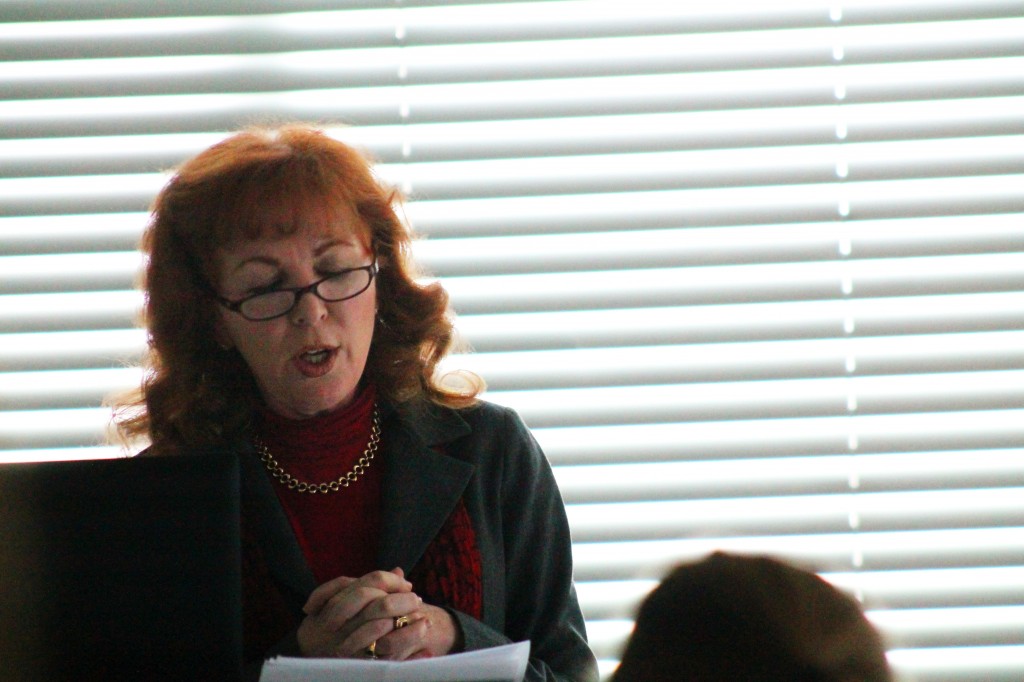
Since the 1848 French Revolution, France has been founded on democratic principles of human rights and social equality. Gayle Zachmann, a professor from the University of Florida, said the promotion of these ideals could distract from the bigger issue at hand — anti-Semitism.
Zachmann, a French professor, spoke in the University Union Thursday night as part of a lecture series sponsored by Harpur Edge. In her presentation, she explored what it means to be Jewish in present-day France.
She started off the talk by discussing the “new anti-Semitism,” a form of radical hostility or prejudice toward Jewish people that developed in the early 21st century. She said it is taking over in France, as citizens have been masking contempt for Jews under the guise of the opinions on the Islamic and Jewish conflict, instead of recognizing it as hatred of the religion itself.
“The French Republic is supposed to be blind to religion,” Zachmann said. “Everyone is one and the same. But because of this, the government doesn’t want to take responsibility for admitting hatred towards a group of people because of their religion.”
Zachmann also said that Zionism, a movement to have one land for all Jewish people, is commonly rejected in France.
“For many people in this country, Jerusalem and the promised land will always remain metaphors,” she said.
Since the early 2000s, she said, clear anti-Semitic practices have been implemented within French society. Zachmann said yarmulkes, jewelry and any charms representing Jewish culture are banned in public. Mezuzahs, a scroll holding Hebrew blessings that is placed outside a Jewish person’s door, are now moved inside the house partly because of fear but also because hiding Jewish identity has become standard in France.
“There are social pressures to hide one’s differences,” Zachmann said. “Being the same is safer. It’s more acceptable to be a Yankees fan than to be a Jew.”
Public school cafeterias also divided their food area into two sections, she said, one with pork and one without, segregating Jews and Muslims from their peers.
Anne McCall, dean of Harpur College, said it is integral to understand that anti-Semitism comes in all forms and affects everyone, not just victims seen in the news.
“It’s not always the big killings or the blowing something up that matters, but daily life,” McCall said.
It was only after the recent terrorist attacks that targeted Jews, Zachmann said, that the government began to recognize the issue as a national one, not just a Jewish one.
“France [has] the third-largest [Jewish] community in the world,” Zachmann said. “It wasn’t until January, though, that people began to take notice to this rich and distinct community.”
The January attacks consisted of the shootings of four men in a kosher supermarket, and an anti-government demonstration throughout Paris. Thousands of people marched in the protest, shouting things like “Heil Hitler,” or “Jews, we don’t want you.”
Robin Stieglitz, a junior double- majoring in Spanish and French linguistics, said she was upset to learn how prominent anti-Semitism is today.
“I know that there is racism everywhere, but people are so determined to get rid of Jews in France,” Stieglitz said. “It’s eerily reminiscent of the Holocaust.”
McCall highlighted the importance of learning about discrimination in different cultures is one way to begin fixing the problem.
“We all need a better understanding of important and disturbing events and of the complexity of debates happening in other countries,” McCall said. “If we look at world news through a critical lens, we can become more tolerant.”


